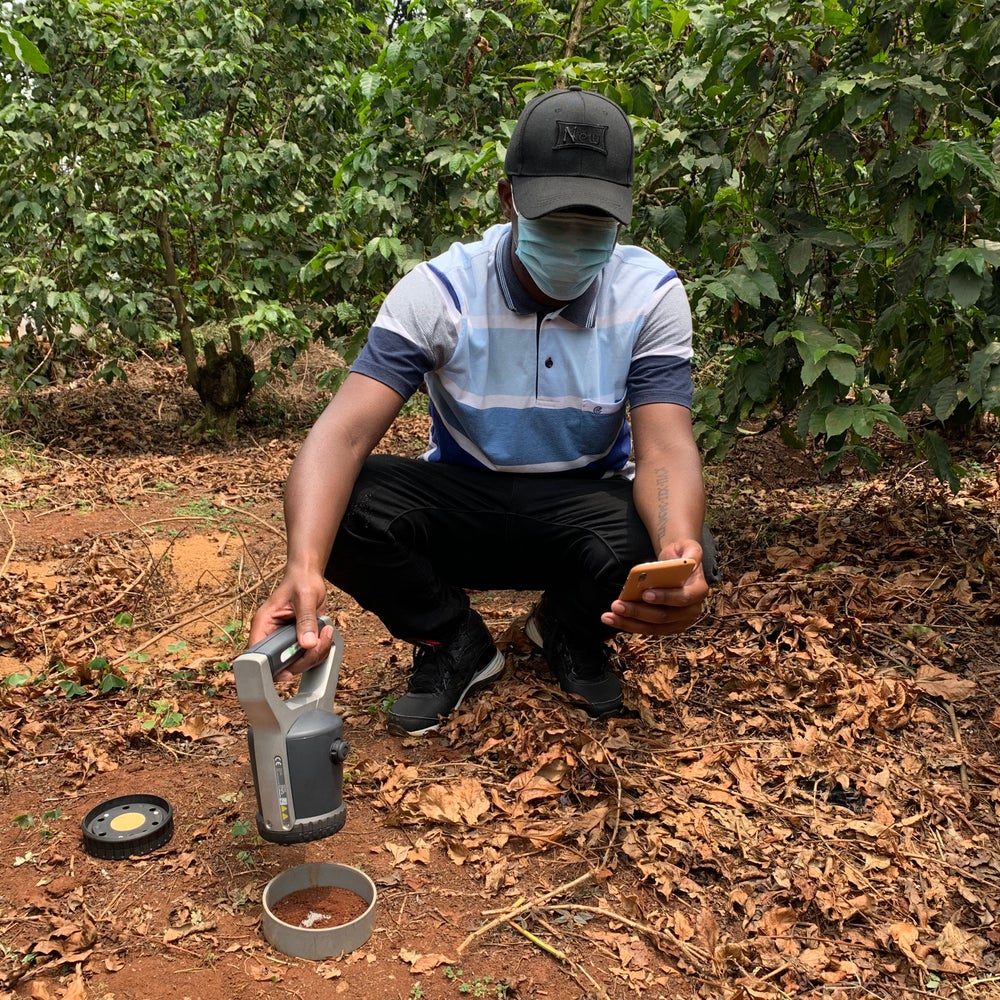From the Field
Monday, November 21, 2022
Improving Soil Health in Rwanda
RWACOF (Sucafina in Rwanda) has been collecting vital farmer data in order to better tailor improvement programs to support the farmers in our supply chain. Recently, we rolled out our first data-driven initiative to distribute lime specifically to farmers with acidic soils. “It requires excellent soil and farmer data to make this work,” says Maryann Wanja, R&D Officer/Agriculture Scientist with RWACOF.

In order to distribute the lime, they hosted “farmer parties" at RWACOF’s washing stations that celebrated farmers while sharing important agronomical information about fertilization. “The farmer parties gave us an opportunity to engage one-on-one with farmers while distributing lime, which needs to be applied to the soil in a specific time window,” Maryann says.
Distributing Farming Inputs Effectively
This is the first year that RWACOF has distributed lime to farmers delivering to their stations. “Distributing lime is difficult because you don’t want to apply lime in areas where the soil acidity is not a problem,” Maryann says. Following RWACOF’s soil testing initiative in 2021 and 2022, they identified about 2,000 farmers whose soil was too acidic and could benefit from applying lime. For the first time, RWACOF has enough data to start implementing targeted interventions like lime distribution specifically to farmers whose soil is too acidic. These farmer parties are just one in a series of targeted, data-driven interventions that can help farmers increase yields, improve quality and enhance their overall income.
The lime distribution project is a 3-year project aimed at optimizing soil conditions and boosting cherry production. Each station has agronomists available to provide training and offer technical support to farmers. They’ll also conduct regular tests to assess changes in soil quality.
This project is stage 2 of an ambitious soil health program that RWACOF launched in 2021. The first step was collecting soil data and analyzing it. Stage 3 is planned for the coming months and will involve distributing organic fertilizers to farmers to help them increase the fertility of their soil.
RWACOF plans to scale up the project over three years. This year, lime distribution is free to identified farmers. Next year, lime will be subsidized and be offered at a nominal rate to ask farmers to claim ownership of the inputs they’re applying to their farms. “Creating a mindset shift is a vital part of our initiative,” Maryann says. They also hope to work with new partners to expand the program to additional beneficiaries and supply a greater volume of lime to more farmers in the future.
Building Community and Trust
The farmer party concept sprung out of the need to distribute lime quickly and efficiently. Lime needs to be applied at least 2 weeks before chemical fertilizer is applied. RWACOF was recently notified that the government would be distributing fertilizer in the coming weeks, meaning that lime needed to be distributed no less than 2 weeks before then. The government already does a great job of supporting farmer success by distributing fertilizer annually at no cost to farmers. The lime distribution project works in tandem with this government service to further support farmers.
“We had a short window of time to make these events happen,” says Tom Swinkels, Head of Strategic Projects. RWACOF’s washing stations sprang into action planning these get-togethers and inviting farmers to attend.
The farmer parties were organized by full-time employees at the washing stations working in concert with RWACOF staff. There was food and conversation, and farmers had the opportunity to consult one-on-one with agronomists about their farm.
In total, about 10,000 farmers across 17 stations attended the parties. The parties gave RWACOF agronomists the opportunity to convey their soil testing results. “Farmers were asking for these results, so this gave us the perfect space to sit down one-on-one with them and go over the results,” Maryann says.
The parties also enabled Sucafina staff to better interface with farmers. For many farmers, it was the first time they met RWACOF’s Managing Director, Harrison Koch, who joined 8 months ago from our Tanzania operation. They also got to meet Kigali-based headquarters staff, including those in finance and logistics who don’t often go to the field to meet with farmers or visit washing stations. This facilitated additional communication and bonding between farmers and RWACOF staff. “The farmers at our parties really appreciated getting to meet Harrison and other staff who they don’t usually interact with,” Maryann says. “In the end, farmers were grateful for RWACOF’s continued support, and this gesture of gratitude towards them and their contribution to the coffee supply chain,” Maryann says. ‘’We also had positive reception from the local government, who appreciated our efforts to invest in farmers’ lives.”
The farmer parties gave RWACOF an opportunity to better engage with and show appreciation for the farmers in our supply chain, all while sharing important knowledge and distributing lime to selected farmers. As we mentioned, this new lime distribution project is just one in a series of new technologically-driven projects aimed at supporting farmers and increasing coffee quality and volume. Keep an eye out for more information about other projects in the coming months!